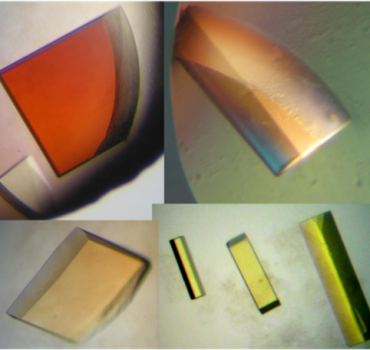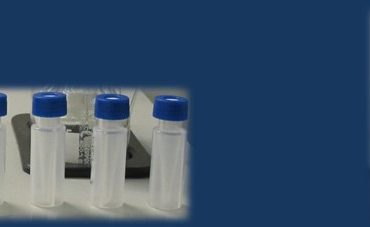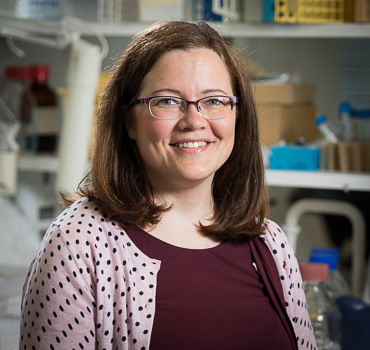Research Groups and R&D Platforms: Basic research

R&D Platform:
Protein Structure and Chemistry Core Facility
Knowledge of protein structure is central to the understanding of biological processes in living organisms and cells. The Protein Structure and Chemistry Core Facility assists investigators in the determination and analysis of the 3-dimensional structure of biological macromolecules and their complexes. The facility consists of an in-house X-ray generator and imaging plate detector, cryo-crystallography instrumentation, several computers, a large collection of crystallisation screens, incubators at various temperatures and a crystal imager for automated inspection of crystallizations. The facility provides modern structure determination approaches through regular access to European synchrotrons and use of fully automated remote data collections. Numerous computer programs are available for all the steps of a crystal structure determination and also for visualisation, analysis, and validation of protein structures, homology modelling and docking predictions. The facility has many years of experience in crystal structure determinations and we are able to undertake projects from academic groups and companies.
Protein Structure and Chemistry
Basic research, Hit to lead, Lead optimization, Molecular modelling, Signaling, Target discovery, X-ray crystallography

R&D Platform:
The Turku Proteomics Facility
The Turku Proteomics unit provides advanced proteomics services for academic researchers and industry for all Finland. We have a full range of state of the art mass spectrometers including Q-Exactive and Q-Exactive HF, Orbitrap Velos ETD, Orbitrap Lumos and a ThermoFisher triple quadrupole. We are the Finnish Proteomics methods development centre specialising in the analysis of Post-Translational Modifications (phosphorylation, N-glycosylation, palmitoylation amongst others) as well as quantification methods (targeted SRM, PRM and DIA/SWATH
We provide a full service for samples (from sample preparation to MS data collection and protein identification and quantification) as well as an open access platform whereby customers who have completed a user course can run their own samples. Most quantification methods are available include label-free, TMT, iTRAQ, SILAC and AQUA. We also provide a direct interface with the Turku Bioinformatics unit allowing seamless statistical evaluation of data.
We have special focus areas of research including biomarker discovery and validation for the clinic and membrane protein analysis. We are developing protocols for small molecule analysis in tissues and serum as well as intact protein-ligand binding monitoring.
Basic research, Biomarker, Drug target, Hit to lead, Lead optimization, Molecular diagnostics, Proteomics, Receptor, Signaling, Target discovery

Research Group:
Lymphocytes and Inflammation
Zhi Chen
zchen[at]utu.fi
Turku Bioscience Centre and Institute of Biomedicine,
University of Turku
Autoimmune diseases, Basic research, Cancer, Genomics, Immunology, In Vitro Diagnostics, Inflammation, Next-generation sequencing, Proteomics, Screening, Target discovery

Research Group:
Biofilm-host –interaction in chronic infection
Riikka Ihalin
riikka.ihalin[at]utu.fi
Department of Life Technologies,
University of Turku
Antibacterial, Bacteriology, Basic research, Biochemistry, Biomedicine, Biomolecular chemistry, Dentistry, Disease models, Drug target, Electron microscopy, Fluorescence spectroscopy, Imaging, Immunology, Infection, Inflammation, Molecular Biology, Molecular Cell Biology, NMR, Proteomics, Receptor, Signaling, Structural Biology, Target discovery, X-ray crystallography

Research Group:
Mechanisms of steroid hormone action
Matti Poutanen
matti.poutanen[at]utu.fi
Institute of Biomedicine,
University of Turku
Basic research, Biochemistry, Bioinformatics, Biomarker, Biomedicine, Breast cancer, Cancer, Data mining, Disease models, Drug delivery, Endocrinology, Genomics, Imaging, In Vitro Diagnostics, Machine learning, Metabolic diseases, Molecular Biology, Molecular Cell Biology, Next-generation sequencing, Obesity, Ovarian cancer, Pathology, Pharmacology, Physiology, Preclinical development, Prostate cancer, Proteomics, Receptor, Reproductive Medicine, Signaling, Systems Biology, Target discovery

R&D Platform:
Structural Bioinformatics Laboratory (SBL)
SBL places biological data within the three-dimensional molecular context, exploiting this knowledge to derive better understandings of biological processes, especially related to ligand binding and discovery of novel ligands. We combine data from many sources, public and project-generated, both experimental and in silico. SBL has a state-of-the-art crystallography laboratory, uses European synchrotron facilities for diffraction data collection, and solves structures in-house. SBL has extensive computational resources: software, molecular databases, graphic devices for 3D visualization, large-capacity data storage, computational clusters, and we make heavy use of CSC IT Center for Science supercomputing cloud resources for in silico ligand screening and molecular simulations. Our groups share space and infrastructure at SBL, providing a wealth of experience. The unit has responsibilities for Biocenter Finland infrastructures in (1) Bioinformatics, (2) Structural Biology, and (3) Drug Discovery and Chemical Biology, providing open-access to protein crystallization resources, scientific IT and bioinformatics services, hardware and software, and long-term project collaboration, available to everyone.
Our experience focuses on proteins and their interactions with natural and synthetic ligands, including proteins, nucleic acids, lipids and carbohydrates. Our researchers have a broad understanding of the sciences and relevant technologies.
Structural Bioinformatics Laboratory
Basic research, Hit to lead, Lead optimization



